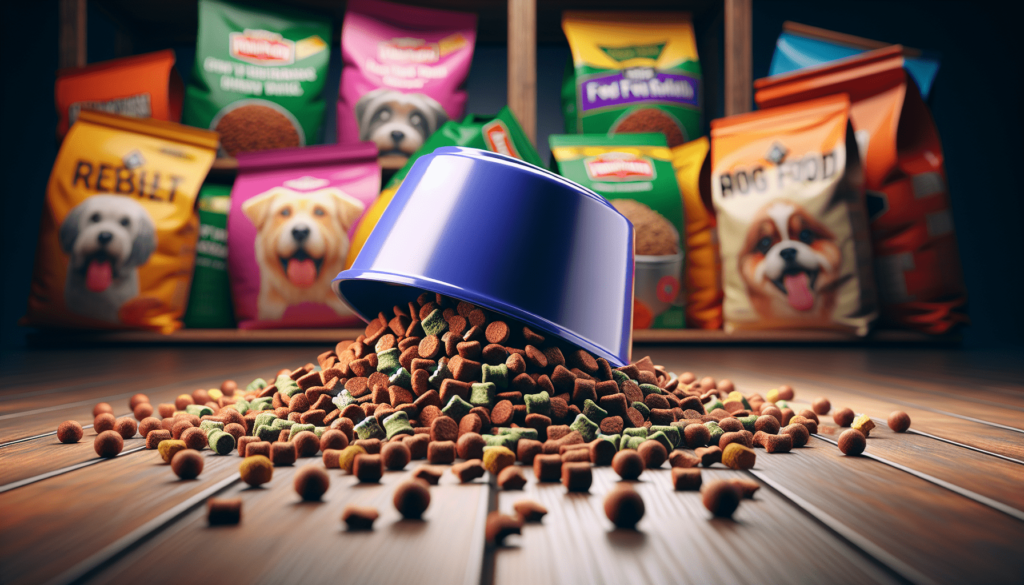Have you ever wondered what ingredients or production issues might cause a dog food recall? As a pet parent, understanding the most common reasons behind dog food recalls is crucial to ensuring your furry friend stays healthy and happy. Recalls can happen for various reasons, ranging from contamination to mislabeling. This article aims to walk you through some of the most common dog food recalls, helping you become a more informed and proactive owner. Let’s delve into this important topic together.

Understanding Dog Food Recalls
First, it’s essential to understand what a dog food recall entails. When a dog food is recalled, it’s due to the discovery of an issue that has the potential to harm pets or that breaches safety regulations. Companies voluntarily recall products when problems are identified, or recalls might be mandated by regulatory bodies like the Food and Drug Administration (FDA) if a significant health risk is detected. Knowing the reasons behind these recalls can help us make informed decisions about the food we provide our dogs.
Common Causes of Dog Food Recalls
Contamination with Harmful Bacteria
A significant reason for many dog food recalls is bacterial contamination. Salmonella and Listeria are the usual suspects, posing threats not only to pets but also to humans handling the tainted products. These bacteria can cause serious health issues, including gastrointestinal problems and severe illness in both dogs and people. When bacterial contamination is identified, a swift recall is often initiated to prevent further distribution of products.
Presence of Foreign Objects
Another typical trigger for recalls is the discovery of foreign objects in the dog food. These can range from metal shards and plastic pieces to bone fragments. Such contaminants can cause serious injuries to pets, such as choking or internal damage if ingested. Manufacturers issuing recalls for these reasons are acting to prevent harm to pets.
Nutritional Imbalance
Dog food must adhere to specific nutritional standards to ensure dogs receive the necessary nutrients. If a product is found to have nutritional deficiencies or excesses, it may be recalled. Nutritional imbalances can lead to various health problems in dogs, such as skeletal issues or metabolic disorders. These recalls are preventive measures to maintain pet health.
Mislabeling or Misbranding
Occasionally, dog food recalls are prompted by labeling issues. If a product’s label misrepresents its ingredients or nutritional content, it can lead to health risks for pets, particularly those with specific dietary needs or allergies. Mislabeling can deceive pet owners, resulting in adverse health effects for their dogs, thus necessitating a recall.
Excessive or Insufficient Vitamins and Minerals
Dog foods need to provide a balanced diet, but sometimes errors occur during production. Excessive or insufficient amounts of vitamins and minerals, like vitamin D or zinc, can lead to toxic effects or nutritional deficiencies. Recalls in such cases are critical to ensure pet safety and avoid potential health complications.

Notable Dog Food Recalls in Recent Years
2018 Pentobarbital Recall
One of the most notable recalls occurred in 2018, involving several popular brands found to contain pentobarbital, a drug typically used for euthanasia. The potential presence of this toxic substance in dog food was alarming, sparking significant concern among pet owners. This incident underscored the importance of rigorous quality checks in the dog food production process.
2019 DCM-Linked Recalls
In 2019, a series of recalls were associated with a potential link to dilated cardiomyopathy (DCM), a heart condition in dogs. Grain-free dog foods were under scrutiny due to a suspected dietary deficiency linked to the development of DCM. This triggered recalls and a broader investigation into the relationship between diet and heart health in dogs.
Ongoing Salmonella Recalls
Salmonella-related recalls are an ongoing concern, with multiple cases occurring over the years. These recalls often span various brands and products, emphasizing the need for consistent testing and stringent safety protocols in manufacturing processes to prevent contamination and safeguard pet health.
Protecting Your Pet: Tips for Pet Owners
Stay Informed
One of the best ways to protect your pet is by staying informed about the latest recalls. Websites like the FDA’s pet food recall page or signing up for alert notifications can help you keep up to date with new developments. Staying informed allows you to act quickly, ensuring you can promptly remove any potentially harmful products from your pet’s diet.
Check Labels and Ingredients
Being vigilant about label information and ingredient lists is also crucial. Ensure that the food you choose meets the dietary needs of your dog and be cautious of unfamiliar ingredients that might pose a risk. If the labeling appears off or inconsistent with previous purchases, it’s a good idea to investigate further or reach out to the manufacturer for clarification.
Consult a Veterinarian
Regular check-ups with a veterinarian can help catch any potential health issues early, especially if you’re concerned about your dog’s diet. A vet can offer expert advice on the best nutrition for your dog, considering factors such as age, breed, and health status. This guidance can be invaluable in navigating the myriad of choices available in the pet food market.
Report Any Adverse Reactions
If you notice any adverse reactions in your pet that could be linked to the food they are consuming, it’s important to report it. Contacting the manufacturer and organizations like the FDA can help trigger an investigation, potentially leading to recalls if a broader issue is identified. Your report could aid in protecting not just your pet, but countless others as well.
Conclusion
Understanding the most common dog food recalls is crucial for any pet owner. From contamination with harmful bacteria to labeling errors, these issues underscore the importance of choosing dog food wisely. By being proactive and staying informed, we can ensure our pets remain safe and healthy. Use the resources available, be vigilant, and never hesitate to seek professional advice if you’re concerned about your dog’s diet.
FAQ
What are the most common reasons for dog food recalls?
The most common reasons include bacterial contamination (like Salmonella and Listeria), foreign objects found in food, nutritional imbalances, mislabeling or misbranding, and incorrect levels of vitamins or minerals.
How can I find out if my dog’s food has been recalled?
You can visit the FDA’s pet food recall page or sign up for alert notifications to stay updated on recent recalls.
Are there specific brands more prone to recalls?
While no brand is inherently more prone, recalls can affect any brand due to the complexities of manufacturing and supply chains. It is essential to research and choose reputable manufacturers committed to quality control.
What should I do if I think my dog’s food is recalled?
First, check the FDA recall alert to confirm. Then, stop feeding the product to your dog and follow disposal instructions from the manufacturer or the FDA. Consult your vet if your dog shows any signs of illness.
Can I prevent dog food recalls by making my dog’s food at home?
Making dog food at home can give you control over ingredients, but it requires thorough knowledge of canine nutrition to ensure a balanced diet. It’s advisable to work with a veterinarian or a pet nutritionist if you choose this route.



